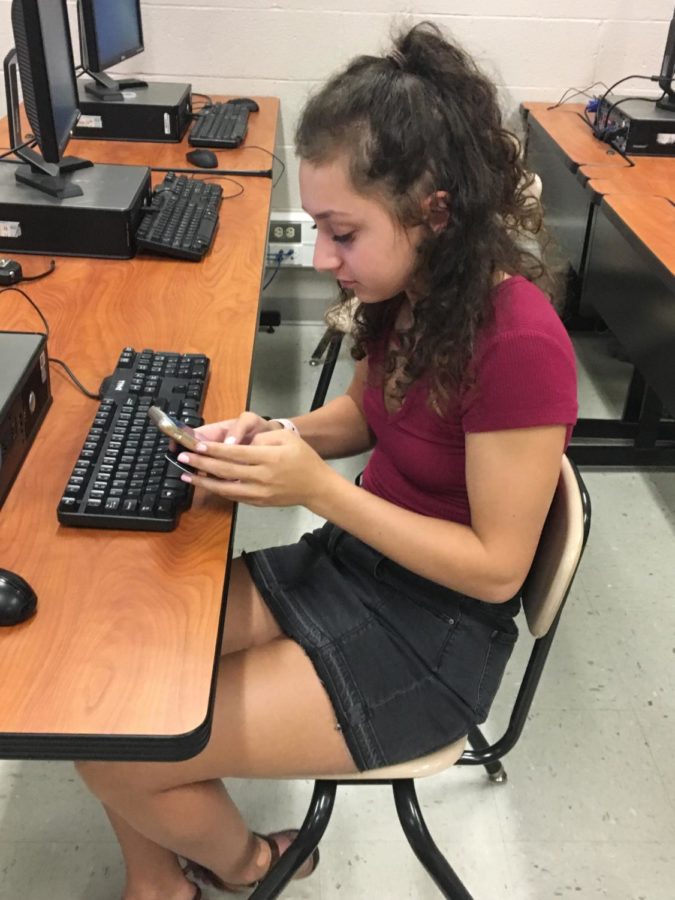Conflicting views about the school phone policy
According to Kelly Tailford, Solon High School’s phone policy is not consistently enforced throughout classes.
May 2, 2018
According to many high school students, Snapchat and other forms of social media are used incorrectly throughout the school day. Many students are photographed or recorded by their peers then made fun of on Snapchat stories finsta accounts. Students are checking social media more often during the school day which is creating both social and educational issues for students.
SHS confronts these issues by having a clear policy regarding the use of cellphones with direct consequences when the rules are broken. Each offense requires the phone to be taken down to the office for a parent to pick up. In addition, first offense in breaking the policy receives a warning, a second offense receives a four hour Saturday school, a third offense receives six hours of community service, a fourth offense receives nine hours of community service and the fifth offense receives an out-of-school suspension.
“We warned the kids at the beginning of the year when we have our student meetings going over the rules,” said SHS Principal Erin Short. “But, we kind of build in the buffer there that the first time you don’t have a consequence, your parents just have to come and pick it up. The thought is that if the parents are inconvenienced they’ll help us enforce our policy a little bit with the students.”
A major reason why this policy is so important to SHS Vice Principal Josh Frazier is to limit instances of cyberbullying, harassment, harmful recording and inappropriate comments made through social media and the internet.
“I personally believe [using a phone in study hall or lunch] just opens the door [to bullying],” Frazier said. “I think that’s when most of the [harassment] would occur is during that down time.”
On the other hand, junior Mitra Kassemi, dislikes the rule regarding phones in study hall or lunch. She said she believes that phones should be allowed during lunch or study hall, because they won’t be a hindrance to the student’s learning.
“I feel that school phone policy wants to promotes a great learning environment for the students during classes, but I also think our phones could be used in our lunch times as a break.” Kassemi said.
Many staff members believe that students need to have face to face conversations with one another. Both Short and Frazier said they think that having conversations in real life is important for adults, as well as students.
“We live in a society where people don’t really communicate anymore and have conversations they would rather communicate through their cellular devices,” Frazier said. “Having some face to face interaction and being away from your cellphone is always a good thing for students and adults.”
SHS teacher Kelly Tailford believes students also need to find ways to have some free time without using their electronic devices. She uses a wall organizer to put their phones in during class. This is Tailford’s way of enforcing the phone policy while also ensuring that students are focused on the class and not their phones.
“Kids now don’t know how to actually have downtime,” Tailford said. “They have to be entertained by something and that’s not healthy.”
According to Tailford, teachers are not consistent when regulating the use of phones in the learning environment. This creates an issue for both students and staff. Tailford notices this issue throughout the day.
“I think it’s confusing for kids to go room to room with different expectations so I think that it helps to have a clear cut policy of no phones,” Tailford said.
Senior Selin Timur feels differently.
“Teachers should have their own opinions of phones and allow students to use them based on how they feel in regards to it,” Timur said. “This would cause a lack of uniformity, however currently [it seems like] 50% of teachers allow phones and 50% don’t so I would argue that currently [enforcement] is rather mis-matched to begin with.”
There are various opinions to the idea of the school phone policy, but the phone policy is something that will never go away. SHS staff will do what is necessary to make a safe and educational environment for their students and will enforce the policy while doing so.

